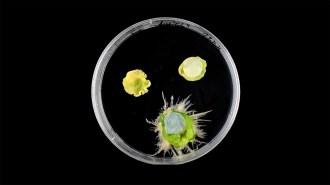Web Special: You fertilized with what?
Talk about your all-natural fertilizer with a high yuck factor. Researchers in Finland have just published results of a study showing that farmers can substitute human urine for conventional fertilizer and get a notable increase in cabbage yields. Moreover, the crop’s taste was at least as acceptable as that of the greens fertilized conventionally.

Surendra K. Pradhan of the University of Kuopio and his colleagues grew cabbages using a conventional fertilizer, human urine that had been stored for 6 months, or no soil amendments at all. In an upcoming issue of the Journal of Agricultural and Food Chemistry, the researchers report that urine treatment yielded cabbages that were bigger and carried fewer germs than either other approach yielded.
Although the nutrient content of urine depends on what someone has eaten, analyses of the urine used in these experiments showed that its nitrogen, phosphorus, and potassium content was comparable to that of commercial fertilizer.
Sauerkraut made from cabbages cultivated in the three ways had slightly different flavors, according to taste panelists, but were equally well liked.
Urine collected from one individual over the course of a year could fertilize a 90-square-meter plot, yielding more than 160 cabbages, the team calculates. The data indicate that a urine-treated plot would yield 64 kilograms more cabbage than one fertilized conventionally, and 256 kg more than an unfertilized crop would.
Earlier this year, the Kuopio scientists reported that cucumbers similarly benefit from the use of urine over conventional fertilizer.






